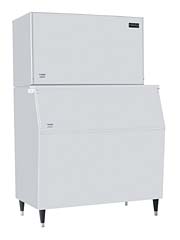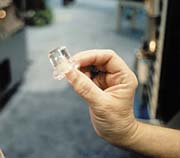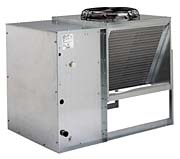
Today, any one manufacturer is able to offer ice making from the smallest of under-the-counter machines to massive units able to produce thousands of pounds of ice in a day. Freezers and refrigerators are also option-loaded, with door configurations of seemingly every combination imaginable.
The diversity means that most customers can get exactly what they want from a manufacturer whose machines a contractor may be most familiar with. And while the configuration options are ever expanding, the technology has, in recent years, not been undergoing major changes or shifting back and forth in engineering philosophies.
Translation: Look for more machines that need service, and you’ll probably know how to work on them.
Such were the impressions garnered from this year’s National Restaurant Association Expo, where close to 2,000 exhibitors showed products for hotels, motels, and restaurants.

ICE MACHINES
An example of what was described as “filling in the gaps in the product line” was demonstrated at the booth ofManitowoc(Manitowoc, WI). The Q-Model Series 370 ice cube machine with a width of 22 inches provides about 370 pounds of ice in 24 hours and slots such ice machine production between company units that make about 320 and 450 pounds of ice, respectively. The Q-Model Series 1600 ice cube machine fits in between the 1300 and 1800 Model units.The company showed its Guardian slime inhibitor, which releases chlorine dioxide in the food zone of an ice machine to inhibit biological growth and associated odors.
Through Manitowoc’s Servend line came the announcement of the SV175 dispenser with flex manifold and “a tighter, more secure seal for top-mounted ice machines”; the UC300 dispenser that integrates Manitowoc’s QuietQube® ice machine; and the QSV dispenser, designed for multiple beverages but with one water line, drain, and electrical outlet.
Scotsman (Vernon Hills, IL) had a major rollout of products including:

Booth officials also noted that a factory-installed antimicrobial compound called AgION™ is being used on all the company’s ice machines.
Hoshizaki America Inc. (Peachtree City, GA) featured the AM Series cuber. The AM-50 produces 50 pounds of ice in a day and has a 29-pound storage capacity. The ice is produced in a “top hat” shape and is said to be clear. Airflow is from the front. There is a sump pump option for situations where the drain is higher than the floor.
Kold-Draft (Erie, PA) pointed out it had ice machines for use “whether you serve 200 meals a day at a neighborhood restaurant or 6,000 meals aboard a luxury cruise ship.” The company also displayed a unit that can offer cubed or crushed ice with the turn of a knob.
IMI Cornelius (Anoka, MN) announced that its Xtreme family of ice machines now has 10 models ranging from 300 to 1,800 pounds of production a day. Among pluses the company noted in the line was a nickel-plated evaporator for corrosion protection and thermal conductivity. The ice harvest uses a batch process to help decrease water and electrical costs. The harvest system also has a pressure transducer that has no moving parts and does not come in contact with the water.
Getting ice from machines to remote locations throughout a restaurant was the emphasis of Lancer (Orange, CA). Its Ice Link has a bin compatible with a number of ice machine manufacturers. A tube system pulls the ice from the bin and transports it along the ceiling and into up to four dispensers as far away as 500 feet.
Follett (Eastern, PA) showed its Ice Device for the transportation of ice from the ice maker to sites in a facility where ice is needed. Ice flows by gravity when the chute door in the bin front is opened.

COOLERS, FREEZERS
Bally Refrigerated Boxes (Morehead City, NC) showed a range of options on coolers and freezers, blast chillers (designed to cool food quickly through the “danger zone” that poses the greater risk of food contamination), and refrigerated buildings. In the same booth, Bally Refrigeration Products drew attention to unit coolers and semihermetic condensing units.Another company stressing the quantity of options was Continental Refrigerator (Bensalem, PA). It claimed to have 1,250 reach-in models.
NorLake Refrigeration Products (Hudson, WI) upped the ante by offering 10,000 models of custom-made walk-ins and reach-ins said to be shipped the same day.
The booth of Silver King (Minneapolis, MN) promoted refrigerators with front venting and no need for rear, top, or side vents. Most all were for under-the-counter applications.
Carrier Refrigerated Equipment Group (Syracuse, NY) displayed products in its Beverage-Air line, including reach-ins, walk-ins, blast chillers, and other products; plus Kelvinator products such as freezers, display cabinets, and ice cream-related equipment.
Zero Zone (North Prairie, WI) showed its XL Maximizer merchandiser, a freezer said to hold up to 30% more product without increasing floor space. It uses S-Coil technology designed to improve heat transfer.

The company also displayed a packaged refrigeration system for walk-in coolers and freezers. The system consisted of a condensing unit and evaporator coil in one package, ready to mount on the top of a walk-in.
TECHNOLOGICAL TWISTS
Elliott-Williams Co. (Indianapolis, IN) called its CleanAir™ UV air purification and filtration system “the most significant advancement in refrigeration ... since refrigeration.” The system can be retrofitted on top of walk-in coolers. The technology combines C-band UV radiation with a charcoal-activated, fine-particle filter to eliminate airborne contaminants such as fungi, mold, bacteria, listeria, and ethylene, according to the manufacturer.To aid in maintaining cold temperatures of buffets, a company called Satellite Cooling (Gurnee, IL) uses a small glycol chiller and cold-conduction modules in its Stealth cooling system. The system uses about one pound of food-grade polypropylene glycol.
Portable evaporative cooling was shown by General Shelters (Center, TX). Its Port-A-Cool unit lowers the temperature of ambient air processed by the unit an average of 18 degrees F, then disperses the air over a large square foot area.
XDX Innovative Refrigeration (Arlington Heights, IL) promoted its technology to reduce power usage and the number of defrosts of the evaporative coil. The company’s Xstream component is added to a system downstream from the expansion valve. It creates what the company calls “a turbulent mix of liquid and vapor.” Officials said it can be used as an upgrade on existing equipment or specified by an OEM.
Alliance Refrigeration Co. (Bensenville, IL) offered installation and service to end users who invest in HVACR equipment. “Our service fleet responds with one call to our emergency service number at anytime,” said president Robert Wartan. “Our service and installation technicians perform with maximum efficiency and minimal interruptions or inconvenience to your business.”
Publication date: 10/07/2002




